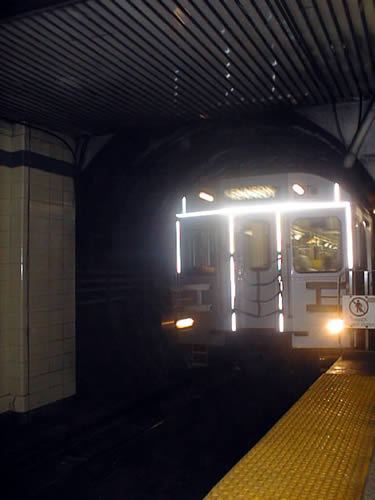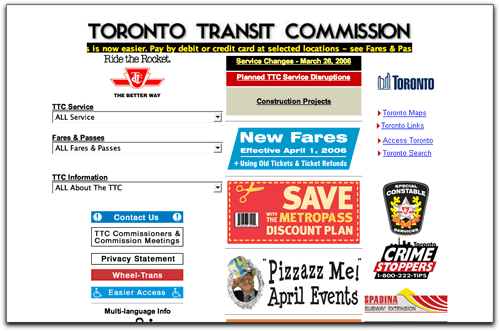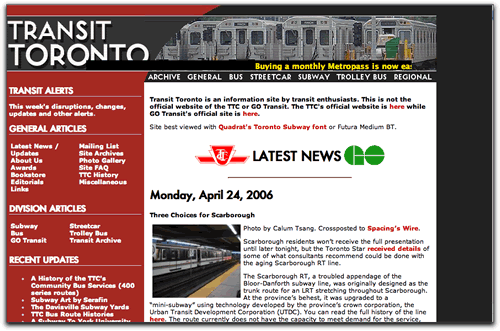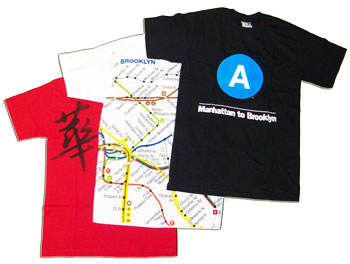Tucows has opened a web service to the public called Feedcache. If you’re a developer building an application that needs to retrieve RSS feeds reliably or search through them, you might find this service useful. For more information about it, see my postings on Tucows Developer and Tucows Farm as well as Ross’ posting on his blog.
Category: Geek
ICT, Meet the TTC
The DemoCamp brain trust and I attended a presentation put on by ICT Toronto, a committee formed by the City of Toronto to boost Toronto’s profile as a leading city of infortmation and communications technologies.
I should pleased at this development, but something really worries me: it’s being run by the City of Toronto. Mayor David Miller and his crew, like most NDP members and voters, are very good at talking about “feeling your pain” but aren’t all that hot on actually getting things done. It’s a problem with Toronto politicians; they worry excessively about projecting the right message, optics and photo opportunities, even when the task is simply to change a lightbulb.
At the risk of alienating some big players in the local tech scene, I will state that I believe that not only is ICT Toronto’s task too important to be left to ICT Toronto; I think that we will have to accomplish that task in spite of ICT Toronto.
Let’s consider another promotional effort run by the city: The Toronto Transit Commission.
The Toronto Transit Commission: Its Fans are Better Than its Management

Say what you want about the marketing and lore that comes with the world’s other transit systems — New York’s, London’s or Paris’ — when it comes to home-grown transit fandom, Toronto does quite well for itself. This is a good thing, too, since the Toronto Transit Commission (a.k.a. “TTC”) is pretty clueless at marketing itself; they’d probably be incapable of marketing immortality. The best promotion for the TTC comes not from the head office, but its riders and fans.
The Fan Site Clearly Beats the Official Site
Consider the difference between the Toronto Transit Commision site, a useless hodgepodge that seems to have been designed by someone with the visual sense that God gave oysters:

Believe it or not, someone got paid to make that.
Now consider the completely unofficial, fan-created labour of love, Transit Toronto:

The difference is stunning.
The Fan Memorabilia Beats the Official Memorabilia
The New York and London transit systems market themselves well. There’s lots of licensed memorabilia for the New York subway:

…and the London Underground’s memorabilia sells like hotcakes:

Where is the TTC merchandise? Good question. It actually exists, but you’re not going to find a link to it from TTC site, and none of it shows the design or imagination of the merch for New York’s or London’s system. The official merch is simply the TTC logo slapped on various objects, with all the creativity and style of those “YOUR COMPANY NAME AND LOGO HERE” ball pens.
Once again, the best stuff comes from the fans. The most desirable TTC memorabilia is Spacing.ca’s lapel-pin buttons featuring the names, designs and colour schemes of every station on the line:
The Efficiency Guide, Unorthodox Tips for Riding the TTC and the Anagram Map
For those of you who want to ride the subway more efficiently, there’s the TTC Subway Rider Efficiency Guide, which tells you where to sit on the train to be closest to the exits for every station on the line. It’s available online and had also been distributed free of charge by loyal TTC fans.
The people behind the Efficiency Guide are going to release a new guide on May 2nd titled Unorthodox Tips for Riding the TTC, which will contain over 200 tips for riding the TTC. Included will be “23 tips on making riders’ journeys more comfortable, 11 tips on how to secure a seat on the busiest routes, and 6 tips to help make travelling with young children a little easier.” The TTC should be giving these guys a year’s worth of free passes for this.
Since this is the TTC’s management, they’ll probably ignore it, or worse still, come out against it. They’ve done this sort of thing before. You might have read about John “Robot Johnny” Martz’ troubles with the TTC. He created a map of the Toronto subway lines featuring the names of the station rearranged into amusing anagrams and got a cease-and-desist order as his reward.
The TTC seems so good at actively seeking out and killing any public goodwill towards it that it’s hard to tell whether their actions are driven by incompetence or malice. You’d think that it was being run by a secret cabal of car dealers.
Back to ICT Toronto
I worry that ICT Toronto will handle the promotion of Toronto as a high-tech hub with the same lethargy, inefficiency and inefficacy as the TTC in promoting itself as a public transport system.
I believe that the true promotion of Toronto as an information and communications technologies centre will come not from top-down committees of investors, but the people closest to technology: those of us who actually make them go. Bottom-up organizations such as DemoCamp, BarCamp, the Mesh Conference, the Rails pub nights and geek gatherings at Linux Caffe will probably do a much better job that ICT Toronto will, especially if their lame web presence (a single static HTML page, and no link to the report about which it made so much fanfare) is any indication.
It all boils down to this: if you’re a technologist in the Toronto area, don’t wait for ICT Toronto to promote this city. The city’s past performance suggests that it could very easily fall flat on its face. It’s up to you!
To close, I’ll leave you with the three things you can do right now to meet ICT Toronto’s goal of making Toronto a high-tech hub:
- Work! Without actual technology to promote, there’s no point in promoting it. Keep on cranking out code, designing sites, working on projects, sharpening your skills and go beyond 9-to-5 development. What made Silicon Valley great was its people’s dedication to their craft that went beyond marking enough time at work to fill a 40-hour week to get a paycheque.
- Blog! The reason we remember Marco Polo and not his father and uncle is because he wrote down his experiences about travelling to China while they didn’t. The rule still holds today: if you’re a techie in the Toronto area and you’re working on an interesting project or can write tutorials or report on developments in the tech world, blog! Tech blogging will help boost Toronto’s tech presence on the web far better than a stack of glossy ICT Toronto brochures sitting in an investment bank’s recycling bin. (ANd make sure to mention that you’re from the Toronto area!)
- Socialize! Computing is just a fancy branch of mathmematics, and mathematician Paul Erdos (you should read his biography, The Man Who Loved Only Numbers) proved that math was a social activity. Get out there and meet with other developers in the area — this city has all kinds of meetings, user groups and gatherings of that nature. Meet your fellow geeks and exchange ideas! Remember, Silicon Valley is as much a product of its after-work gatherings as the work done in the garage.

A wide-angle shot of the MaRS Centre, where the event was held.
I caught last night’s ICT Toronto gathering at the MaRS Centre, where ICT Toronto announced the release of their “cluster development strategy” paper — a plan to boost the competitiveness and standing of Accordion City’s information and communications technology sector over the next five years.

A close-up shot of the MaRS Centre entrance.

It was easy to spot the DemoCamp gang — me, David, Jay, Sutha, Bryce, Mark — among the attendees, who numbered around 100. We were the only people there not in suits. It certainly looked as though we were there only people there who wrote code for a living. We made sure to mingle and found that most of the attendees seemed to be from the management side of various information and communications tech firms or from organizations that invested in them.

The riff-raff! From left to right: David Crow, Sutha Kamal, Jay Goldman.
While waiting for the presentations to begin, we talked about how we could get some of the “suits” in the room to attend some of the upcoming events like Mesh, DemoCamp or BarCamp. Would these events hold any interest for them? I suggested that we “sell” the idea of such events to them as some kind of “walk on the wild side” tour. “What Burning Man is to us, DemoCamp and BarCamp could be to them!”

David enjoys a drink; Jay prays that nobody mistakes him for a bike courier.
In addition to my notes below, Mark Kuznicki and Rob Hyndman have posted blog entries about the event as well. The Globe and Mail has an article on ICT canada titled Toronto Aims to be High-Tech Hub and we have yet to see if the National Post is going to take a break from their “Oil! Oil! Yeah, baby, we got the Prime Minister and the oil! Suck it, Eastern Canada!” binge long enough to notice.

The strategy proposed by ICT Toronto boils down to these four points:
- Increase collaboration between education, industry and government in the field of information and communications technologies.
- Increase the profile of the information and communcations technology sector.
- Increase the competetitiveness of our information and communications technology businesses.
- Retain and attract information and communications technology businesses.
They presented an executive summary of the strategy paper after the presentations, and the full paper is now available for download [600K PDF].
A Couple of Videos of the Crowd
Notes from the Speakers

Here are my notes from the presentation. The first speaker was Accordion City mayor David Miller, followed by three speakers from the ICT Toronto working group, followed by a question-and-answer session.
Mayor David Miller
- The MaRS Centre is a symbol of of what Toronto can do with technology,
and by extension information technology.
- MaRS is the only research centre of its type located in a downtown
location, and a prime one at that. It’s across the street from
a world-class university across the street, some of the world’s best
research hospitals just down the street, a short walk from the most
respected financial institutions in the world, plus Toronto Hydro —
who are setting up the city with WiFi across University avenue.
- We should be comparing ourselves to the world’s great cities.
- Toronto is a world leader in mining finance — our competitors are
cities like London! We need to think of ourselves in the ICT cluster
in the same way.
- On a business developement mission to New York City, Miller sold
the virtues of Toronto to businesses there. Their responose at the
end: “We didn’t know that about Toronto.” Toronto needs to sell itself
better: “The only thing we haven’t done is tell our story.”
- Our goal: Make Toronto the 5th leading ICT sector in the world.
David Ticoll
His presentation: “Toronto’s ICT Industry in a Global Context”
Some statistics:
| Canada’s workforce, c. 2001 | 15.4 million |
| Toronto’s workforce, c. 2001 | 2.4 million |
| Canada’s ICT and related workforce, c. 2001 | 580,000 |
| Toronto’s ICT and related workforce, c. 2001 | 133,000 |
| Service occupations facing global competition | 80+ |
| Affected workers in Canada | 2.4 million |
| Affected workers in Toronto (guesstimate) | 550,000 |
| Canada’s world rank as exporter of business services in 1995 | 6 |
| Canada’s world rank as exporter of business services in 2002 | 13 |
On Offshoring
- We’re not keeping up in the use of offshoring.
- It is both a problem and a competitive advantage
- If you offshore, you send away jobsm but if you don’t…
- You don’t lower labour costs
- You lose the ability to do certain things that would otherwise
be prohibitively expensive
- Offshoring is a competitive challenge with ambiguity
On India
- Showed a photo of an oxcart in the middle of automobile
traffic. The oxcart is delivering materials for the construction
of a superhighway. That’s their challenge — their infrastructure for
the infrastructure is a mix of modern and archaic.
- Showed a photo of the Accenture campus in Mumbai. “There are about
5,000 Accenture employees in Canada. There are 18,000 in India right
now.” Accenture’s goal is to have 50,000 in India in 3 years.
- Accenture seems to follow a pattern. They recently bought a Wall
Street firm, moved it to Toronto for about 6 months to make it
operational, and then transported it to India.
- Offshoring will be a $110 billion industry by 2010
- India’s potential share, should they “stay the course”: $60 billion
- If India takes an “innovation” strategy, their potential share could
be as high as $70 to $80 billion
- The Indian government is a very well-educated group who understand
technology. India’s president is a rocket scientist…literally!
- They’re pushing for innovation; not just “predictable work”
- Promod
Haque
(Norwest Venture Partners) is working on a US/Indiajoint arrangement to create a “Bell Labs” in India”
- The arrangement would be to do bleeding edge R&D with the US doing
the “R” and India doing the “D”.
- The US would invest $500 billion
- India’s strengths:
- Strong national strategy, with government and industry working
together
- Culture of winning
- Continuous learning and questioning
- Strategic thinking
- Strong domestic industry
- Articulate, knowledgable government leadership
- Strong national strategy, with government and industry working
- India’s weaknesses:
- Infrastructure
- Other emerging countries moving into the same business
- Things we need to ask:
- What should go offshore to make our businesses more
competitive?
- How do these deals yield competitive gains?
- How do we prepare our young people for the job landscape of the
future? (It seems to favour well-rounded people over those with
someone with a narrow skill set.)
- What about geopolitical plays — such as the proposed US/India
deal? This sort of thing isn’t on the radar of the federal
government with their “5 priorities”.
- What should go offshore to make our businesses more
- Things we need to do:
- Embrace productivity-enhancing business investments
- Foster domestic exportable knowledge-based services
- Partner with government
- Compete and constantly rethink strategy
- Remember Andy Grove’s motto: “Only the paranoid survive”
Ron Friedman
- ICT Toronto is concetrating on these sectors:
- Computer and telecommunications manufacturing
- Software development
- IT and telecom services
- New media
- Toronto ICT stats:
- 3rd largest ICT city in North America — only surpassed by
the San Francisco Bay Area and New York City
- 3300 ICT companies in the Toronto region
- These companies have a total of 148000 employees
- They generate $30 – 35 billion annually
- They generate $6 billion in exports
- ICT is the fifth largest employment category in Toronto
- 3rd largest ICT city in North America — only surpassed by
- There is a lack of political recognition of the importance of the
ICT sector
- Toronto has a high level of entrepreneurship
- The vision: for Toronto be be recongized as one of top 5 ICT
centres in the world by 2011
- The plan:
- Establish ICT Toronto as a central point of contact for the
world
- Bring people together to do business
- Link ICT and key economic centres
- Build professional development centres and business mentoring
services for the entrepreneurial community
- Advocate for federal or provincial research institute
in the Toronto region (Toronto lacks federal/prov-funded
ICT research organizations
- Ensure that TO’s wireless infrastructure is leading-edge
internationally — assess future bandwidth and wireless needs
and make sure that we have world-leading WiFi users to match
- Implement an international marketing communications action plan
- Establish ICT Toronto as a central point of contact for the
Frank Maw
- Canada:
- Currently experiencing a bout of prosperity
- But: there are unprecedented levels of displacement in labour —
manfacturing, agricultural, forestry and fishing are going to
emerging economies
- China graduates more engineers annually than all the North American
engineering students and profesisonal engineers put together
- When it comes to information and computer technologies, Toronto is
3rd in North America
- Among the qualities that make Toronto attractive to high-tech
companies:
- World-class universities
- A rich city culture with lots to do and cultural diversity
- A creative class and “bohemian charm”
- According to KPMG, Canada is the most competitive of the G8 nations
- Why did we set the goal to be in the top 5 tech cities in the world
by 2011?
- To create large and growing stream of jobs for our kids and
grandkids
- Generate incremental tax revenue at the local, provincial and
federal levels
- To boost other business segments
- Because ICT is a market segment with “currency”
- To improve our quality of life and standard of living
- To create large and growing stream of jobs for our kids and
- We won’t compete on cost, but quality
- There needs to be political will at all 3 levels of government
Points Raised During the Q & A Session

- There are about 40,000 people in Canada who are doing
“nearshoring” work
- We haven’t done an assessment of what Canada’s real assets are
- The big ICT challenge: finding good, affordable management
- Our strength: initial innovation – pre-commoditization
- Structural problem in canadian ICT industry — large and medium sized players are foreign-owned, which makes it hard for the presdient of a Canadian branch office to promote Canada
- Toronto’s current ranking in world — “Embarrassingly, we don’t know”. We know that we’re number 3 in North America, but don’t know the world ranking. Currently looking into that.
- Areas for early attention:
- Fusion between financial industry / IT
- Digital media world — partnered with San Francisco — creating centres of excellence
- ICT accounts for 42% of R&D spending in the private sector but only 2% of R&D spending at Canada’s universities.

Only moments after finishing my blog entry covering 5 high-tech gatherings taking place here next month, I went to the kitchen to grab a drink when I spotted the front page of the Business section in today’s Toronto Star. The headline reads: Boost infotech in GTA: Report.
It turns out that Toronto has the third-largest information and computer technology (ICT) workforce in North America, after San Francisco and New York and accounts for CDN$35 billion (US$31 billion) in sales each year.
(For those of you not from around here, GTA means “Greater Toronto Area”. “Toronto” is a popular nickname for Accordion City.)
Here’s an excerpt:
If it hopes to keep up with New York and San Francisco, the Toronto area’s hodgepodge information and communications technology sector needs to band together and hype its brand around the globe or risk watching smaller markets surge ahead.
That’s the thrust of a new report, spearheaded by the City of Toronto and due out today, that diagnoses an industry employing 148,000 at 3,300 area firms but that is geographically spread out, too loosely affiliated and lacking the kind of unified voice that could get politicians’ attention.
“Toronto’s ICT sector does not enjoy the recognition of such internationally recognized locales as Silicon Valley, Austin, Boston or Bangalore,” the report says. “This inevitably puts Toronto at a disadvantage with respect to attracting foreign and domestic investment. …The whole is currently less than the sum of its parts.”
The 110-page report on what is the third-largest such cluster in North America makes many suggestions, calls for the formation of an umbrella organization of stakeholders to better promote the industry, and urges them to preach the cause to policy makers who ignore the industry.
The report urges that by 2011, we should:
- Move from third place in North America in terms of company growth and investment and take one of the two top spots
- Increase investment in ICT research in the region by 25%
- Increase ICT sales and employment by 20%
- Attract 5 new multinational firms to the region
Problems to be overcome include:
- Government and investor preoccupation with “darlings” such as biotech and nanotech, whose economic impact is “negligible”
- The governmental perception that Toronto is an economic “fat cat” (not true; Toronto carries the province and helps to carry the country)
- Competing with “China Inc.” (or perhaps the “BRIC” countries — Brazil/Russia/India/China)
- The scattered nature of Toronto ICT firms — maybe there needs to be an organization representing us that provides a central point of contact
I like to think that those of us who’ve been pushing to get the tech community together for gatherings to meet each other and share ideas are doing our part to help meet the objectives in this report. I also think it’s something that we should discuss at our gatherings — I’m going to have to get my paws on a copy of the report.
Update
Lots of things are happening in Accordion City’s high-tech scene over the next month:
DemoCamp 5.0: Tuesday, April 25th
![]() DemoCamp is Toronto’s monthly gathering in which people from the high-tech community demonstrate their projects in front of their peers. You’ve got ten minutes and a “no PowerPoint, just demo” rule to make your presentation, after which anyone in the gathering can ask questions and make comments. This is a popular event — 140 people attended the last one.
DemoCamp is Toronto’s monthly gathering in which people from the high-tech community demonstrate their projects in front of their peers. You’ve got ten minutes and a “no PowerPoint, just demo” rule to make your presentation, after which anyone in the gathering can ask questions and make comments. This is a popular event — 140 people attended the last one.
This month’s DemoCamp takes place at the Bahen Centre for Information Technology (on the University of Toronto campus) on Tuesday, April 25th from 6:30 to 8:00 p.m., followed by a gathering for dinner and drinks at a nearby pub. For more information, visit the wiki.
Toronto Ruby User Group Hackathon: Saturday, May 6th
 TRUG — the Toronto Ruby User Group — is doing its part to improve the Ruby library and Tucows is glad to host the hackathon where they’ll be doing it. This hackathon’s goal is to implement the functionality of libarchive and libtar as both a pure-Ruby versions and as Ruby/C bindings to the libarchive and libtar libraries.
TRUG — the Toronto Ruby User Group — is doing its part to improve the Ruby library and Tucows is glad to host the hackathon where they’ll be doing it. This hackathon’s goal is to implement the functionality of libarchive and libtar as both a pure-Ruby versions and as Ruby/C bindings to the libarchive and libtar libraries.
The Hackathon will take place on Saturday, May 6th, from 10:00 a.m. to 7:00 p.m. at the Tucows offices. Ruby local hero Austin Ziegler will provide the pizza. Sign up on the wiki!
Drupal Camp: Friday, May 12th
Drupal Camp’s goals are to:
- Introduce new programmers/developers and consultant to the Drupal platform
- Allow for intensive skill sharing among established developers/consultants
- Give back to the Drupal project with a sprint to fix bugs and improve documentation
For more information, consult the wiki page.
Toronto BarCamp 2.0: Saturday, May 13th and Sunday, May 14th
 First, there was the invitation-only Foo Camp started by O’Reilly and Associates. BarCamp was created in response (“foo” and “bar” are often used as example names of programming constructs). The first Toronto BarCamp took place in November 2005, and the next one happens next month.
First, there was the invitation-only Foo Camp started by O’Reilly and Associates. BarCamp was created in response (“foo” and “bar” are often used as example names of programming constructs). The first Toronto BarCamp took place in November 2005, and the next one happens next month.
BarCamp can be described as:
BarCamp is an ad-hoc un-conference born from the desire for people to share and learn in an open environment. It is an intense event with discussions, demos and interaction from attendees.
All attendees must give a demo, a session, or help with one. All presentions are scheduled the day they happen.
BarCamp takes place on Saturday May 13th and Sunday, 14th in the Liberty Village area of Toronto. See the wiki for more details.
Mesh Conference: Monday, May 15th and Tuesday, May 16th
 From the conference site:
From the conference site:
You will hear from thought leaders, connect with peers, and get a better understanding of the impact of new developments online. mesh brings together people who are passionate about the potential of the Web to change how we live, work and play. Meet the next generation of Web ideas, leaders and companies at mesh.
The Mesh Conference — of which Tucows is a “supporting sponsor” — takes place on Monday, May 15th and Tuesday, May 16th at the MaRS Centre. For more information, visit their site.
The marketing team here at Tucows has informed me that domain names are increasing in value. People are forking outbig money for them again. I hear that domain names ending with the word “world” — for example, “pantsworld.com”, “steakworld.com”, “accordionworld.com” — are highly prized.
(If you’d like to know more interesting facts about domain names, Dennis Forbes has written an excellent article on what’s taken and what’s still available.)
I have decided that I have not exercised my domain name registration powers enough. No more!
I have claimed that the Internet would be “over” — not “over” in the non-functional sense, but “over” as in the way acid-wash jeans are — when the domain name drinkyourownpee.com was registered. I have decided that I must destroy the internet in order to save it and decided to register it myself. It’s mine now. Mine! Drink Your Own Pee Dot Com! Whoo-hoo!
(Ahem.)
And now comes the experiment. I’m going to see if I can turn it into a money-maker. There are all sorts of strategies I can try; I’m going to take some for a test spin and see which ones work. If drinkyourownpee.com makes me enough money to take The Missus out to dinner once a month, I’ll consider it a success. I’ll keep you informed of my progress.
(Suggestions are welcome — just leave them in the comments!)
The “It Should Be Obvious, But Just In Case It Isn’t” Disclaimer
I do not, I repeat, do not drink my own pee.
Update: Or anyone else’s pee, you wiseguys.

